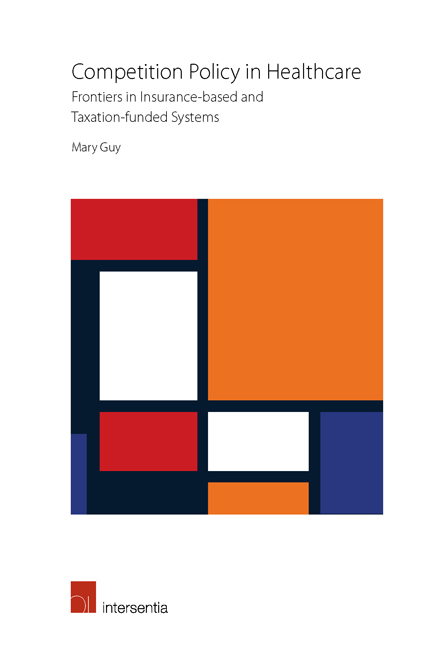Book contents
- Frontmatter
- Foreword
- Preface
- Acknowledgements
- Contents
- List of Cases
- List of Legislation
- Table of Figures
- Abbreviations
- Introduction
- Chapter 1 Competition Reforms in Dutch and English Healthcare and the Development of Competition Policy
- Chapter 2 Competition Law: Its Applicability and Application in Dutch and English Healthcare
- Chapter 3 Sectoral Regulation: The Relationship between the Competition Authority and the Healthcare Regulator in the Netherlands and England
- Chapter 4 Merger Control: Hospital Mergers, General Merger Control and the Development of ‘Healthcare-Specific’ Merger Control in the Netherlands and England
- Conclusion
- Bibliography
- Index
- About the Author
- Frontmatter
- Foreword
- Preface
- Acknowledgements
- Contents
- List of Cases
- List of Legislation
- Table of Figures
- Abbreviations
- Introduction
- Chapter 1 Competition Reforms in Dutch and English Healthcare and the Development of Competition Policy
- Chapter 2 Competition Law: Its Applicability and Application in Dutch and English Healthcare
- Chapter 3 Sectoral Regulation: The Relationship between the Competition Authority and the Healthcare Regulator in the Netherlands and England
- Chapter 4 Merger Control: Hospital Mergers, General Merger Control and the Development of ‘Healthcare-Specific’ Merger Control in the Netherlands and England
- Conclusion
- Bibliography
- Index
- About the Author
Summary
Competition in healthcare provision is a subject which attracts much controversy, with an obvious sensitivity being the tension between competition (with an inherent focus on ‘winners’ and ‘losers’) and solidarity (defined here simply as the principle of organising healthcare provision to enable universal access). This tension can be said to arise because ‘we do not come to markets as equals’ and, fundamentally, because solidarity forms the ‘ideational point’ upon which EU Member State healthcare systems converge, regardless of whether these are, broadly speaking, taxation-funded (such as the English National Health Service (NHS)) or insurance-based (such as the Dutch system). An immediate contrast becomes evident with how competition has developed in US healthcare, where efficiency appears to be prioritised over equity.
The issues become more complex when it is realised that the distinction between a taxation-funded system and an insurance-based system has implications for the ways in which, and the extent to which, competition can be developed, regardless of a common starting-point of solidarity. This is because
in a supply-driven, tax-based system, governments are likely to determine the precise levels of benefits, whereas governments that rely on a health insurance scheme are more likely to leave some room for demand-driven competition with regard to the benefits that the insured persons are entitled to (for instance, based on supplementary insurance).
A further distinction arises between competition, and competition policy. Whereas the former may be wide-ranging (depending upon the scope for competition), the latter may appear more rigid: the underlying legal framework is characterised by binary questions of applicability and exceptions which may not provide the flexibility needed to experiment with competition as a form of healthcare system modernisation. The underlying framework may also not offer much recognition, let alone accommodation, of (public interest) values inherent in healthcare provision, namely, accessibility, affordability and quality. Ultimately, competition reforms of healthcare provision appear to attract a degree of (political) sensitivity which does not attach to other sectors, or even to ancillary aspects of healthcare such as mergers of health insurers or pharmaceutical companies.
- Type
- Chapter
- Information
- Competition Policy in HealthcareFrontiers in Insurance-based and Taxation-funded Systems, pp. 1 - 18Publisher: IntersentiaPrint publication year: 2019

